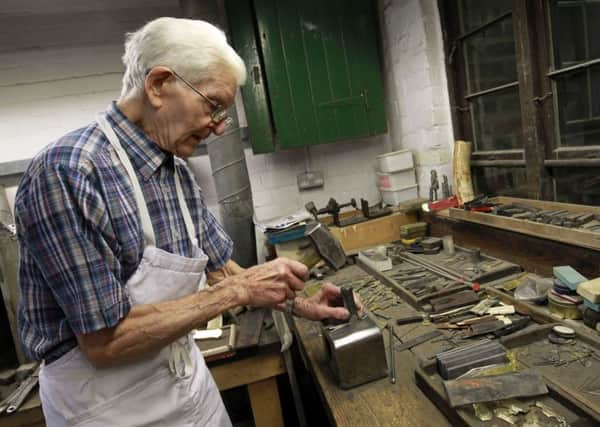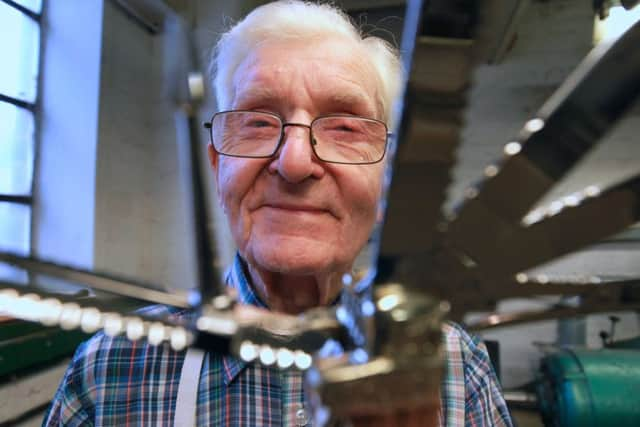Life is still at the sharp end for expert Sheffield craftsman in his 90th year


Stan Shaw is proudly showing off the many implements on one of his coachman’s knives - an elaborate, impressive creation, with a handle made of the finest buffalo horn.
“That’s £1,800, that - they sell like billy-o,” he remarks with a chuckle, before adding reflectively: “I’ve been doing this for 76 years.”


Advertisement
Hide AdAdvertisement
Hide AdIndeed, the craftsman - who could be the last of Sheffield’s ‘little mesters’ - seems to be surprising himself with his longevity. He will be 90 this year, but is still hard at work producing handcrafted pen and pocket knives at his home in Deepcar and, for two days a week, at a workshop in Kelham Island Museum.
Stan has a four-year waiting list for orders, and his knives are sought after by collectors across the world - each blade stamped with Stan Shaw, Sheffield, England. He uses exotic materials such as real stag antlers, mammoth’s teeth, gold and mother of pearl, with a range featuring knives with two to 10 blades.
“I have to make all the parts myself - grind and temper and do every mortal thing, which is better really. That’s why they’re expensive, because I’m doing a lot of men’s work. In the old days one man did one job, but now there are no men left, so I have to do everything myself.”
Stan started as an apprentice knifemaker in 1941 at Ibbersons, aged 14. He missed years of school, having spent a long stretch in the old King Edward’s orthopaedic hospital in the Rivelin Valley when a nasty hip injury, suffered in a fall off some roof slates, led him to contract TB. (Stan also needed a bone graft in one hip, which made it permanently stiff.)


Advertisement
Hide AdAdvertisement
Hide Ad“When I got to be 14 years of age I wondered - because I’d never done metalwork or woodwork - what am I going to do for a living? I went on to Rockingham Street and saw Ibbersons and knocked on the door and said ‘Can I have a job, Mr Ibberson?’
“I went upstairs to see him, in a little ante-room, and there were all the knives in glass cases. I said ‘I want to make them’. I don’t know why I said it, I’d never used tools in my life, so he sent for his head cutler and said ‘This lad wants to make knives, will you have him?’
“So I started with him the following morning. I took to it like a duck to water, like it was made for me.”
He is keen to point out that, even then, only he was learning to make the more intricate knives he still turns out today.
Advertisement
Hide AdAdvertisement
Hide Ad“There were a lot of men making common knives - one-blade pocket knives, pruning knives, scissors, tableware and stuff like that. I only got about five shillings a week, there was no money in it. Right the way through I was fighting for a raise every five minutes - ‘Can I have a penny an hour?’”
Stan began working for himself in 1987, when many of the old cutlery factories were closing down. He took advantage of a Government enterprise scheme offering the newly self-employed £40 a week for 12 months, and found his business ‘took off straight away’.
“I made a few knives and went to the Sheffield Scene shop on Surrey Street. I came out with £1,000 worth of orders! I’ve never looked back since. I had visions of going round shops trying to sell knives, but it never happened that way. So quality pays. There’s always somebody who wants something better.”
He took a workshop on Garden Street, but was tempted by the offer of a rent-free space at Kelham Island seven years ago. With visitors peering in through the window, Stan takes on the air of a living exhibit, but he’s reluctant to accept that role.
Advertisement
Hide AdAdvertisement
Hide Ad“I’m here at seven o’clock - there’s nobody here, I can get on with my work for four hours, and as soon as the museum opens there are knocks at the window and the door, bells going...”
Stan begins making a knife with sheets of nickel, brass and steel, bought from a merchant on Spital Hill. He cuts out his own blanks - the starting point for blades - with tin snips, then goes through a laborious process of hardening, tempering, grinding and polishing to reach the finished article.
The only piece of machinery he uses is a grinder, and he makes all the tools on his knives - such as corkscrews - himself. He usually has around five knives on the go, to maintain a steady flow of production, and has had the same set of hammers since he was a teenager.
“When people order knives from the United States I tell them they’ve got to fetch them - I don’t post anything,” he says.
Advertisement
Hide AdAdvertisement
Hide Ad“I’ve got a bloke coming up on Sunday from London for a folding luncheon knife, I’ve had it for six months. They don’t get them if they don’t fetch them. There’s tremendous demand.”
Famous customers have included the Queen - she was treated to a knife in platinum with a Royal coat of arms - President George HW Bush and members of Elvis and Buddy Holly’s backing bands.
He recently took on a starring role at a function linked to the Advanced Manufacturing Research Centre at Catcliffe, demonstrating his skills to representatives from Rolls-Royce and Boeing.
“They were knocked over, these high-powered business people and tip-top engineers in their field. They had never seen knives made like this, by hand, in their lives. They couldn’t understand how a chap could make knives by hand to this quality, only by files and hacksaws and hammering and grinding. That’s the only power I’ve got - they were looking round for milling machines.
“They paid me for talking to them – better still!”
Advertisement
Hide AdAdvertisement
Hide AdHe adds: “Richard Caborn said, ‘You deserve an honour, because you’re promoting Sheffield, even now’. It would be nice.”
Stan has a grown-up daughter and son with his wife of 62 years, Rosemary, and is making his four teenage grandchildren special knives for their 18th birthdays. “They’re nowhere near 18 yet, but I’m doing it now before I go! They get a special knife for Christmas - in with the toys - and one for their birthdays, so they’ve a lot of knives. If they get hard up they can sell them all.”
Stan accepts that there are other knifemakers operating locally, and that the trade itself is not extinct, but he sees no future for his type of ‘one-man band’.
“Everybody says the same - ‘Why don’t you take on an apprentice?’ - but a lot goes into it, insurance and wages and so on. It’s a tricky thing. You get to my age and you don’t want the hassle. I’m the last little mester making these knives. I want to keep working. People keep saying ‘When are you retiring?’ But it’s not work, to me. I don’t feel 89 and I never get fed-up because every knife is different.”